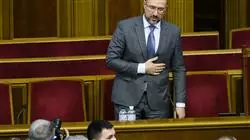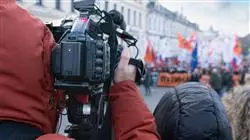University certificate
Scientific endorser

Scientific endorser

The world's largest faculty of journalism and communication”
Introduction to the Program
Political Communication puts into action specific strategies that require the journalist to have a deep knowledge of the political functioning and its message. This Advanced master’s degree will enable you to move with the efficiency of an expert in the sector"

Politics is the most specific activity of human beings and is linked to all the processes that surround societies. Political activity, in its attempt to shape society according to individual and collective ideals, has as its main objective the attainment of power, which represents, in modern democratic regimes, the attainment of a sufficient number of citizen support to be able to develop an organization of society close to its ideological approaches.
In this context, journalism and Political Communication are of vital importance, through which citizens get to know their possible representatives, acquiring sympathies and dislikes that lead them to elect certain institutional representatives.
Ideologies, relations with power and institutions, information flows and their intentionality, Fake News, as well as many other factors, become the key to an essential knowledge for the journalist in this sector, so it is essential to have a high level of knowledge in the field. In this way, Political Communication becomes one of the sectors that requires greater specialization and expertise, in order to differentiate and offer the quality information that citizens should receive.
Throughout this specialization, the student will learn all of the current approaches to the different challenges posed by their profession. A high-level step that will become a process of improvement, not only on a professional level, but also on a personal level.
This challenge is one of those that TECH assumes as a social commitment: to help the specialization of highly qualified professionals and develop their personal, social and work skills during the development of the same.
The student will not only be taken through the theoretical knowledge offered, but will understand another way of studying and learning, more organic, simpler and more efficient. TECH will work to keep them motivated and to create a real passion for learning, pushing the professional to think and develop critical thinking.
This Advanced master’s degree is designed to give the student access to the specific knowledge of this discipline in an intensive and practical way. A great value for any professional.
Furthermore, as it is a 100% online specialization, the student decides where and when to study. Without the restrictions of fixed timetables or having to move between classrooms, this course can be combined with work and family life.
High level learning, supported by an advanced technological development and the teaching experience of the best professionals"
This Advanced master’s degree in Political Communication contains the most complete and up-to-date program on the market. The most important features include:
- The latest technology in online teaching software
- A highly visual teaching system, supported by graphic and schematic contents that are easy to assimilate and understand
- Practical cases presented by practising experts
- State-of-the-art interactive video systems
- Teaching supported by remote education
- Continuous updating and retraining systems
- Autonomous learning: full compatibility with other occupations
- Practical exercises for self-evaluation and learning verification
- Support groups and educational synergies: questions to the expert, debate and knowledge forums
- Communication with the teacher and individual reflection work.
- Content that is accessible from any, fixed or portable device with an Internet connection
- The banks of complementary documentation are permanently available, even after training
A program created for professionals who aspire to excellence and that will allow you to acquire new skills and strategies in a fluent and effective way”
TECH's teaching staff is composed of working professionals. In this way, the university ensures that it provides the training update objective it intends. It also has a multidisciplinary team of trained and experienced professionals in different environments, who will develop the theoretical knowledge efficiently, but, above all, who will put at the service of the specialization the practical knowledge derived from their own experience.
This mastery of the subject is complemented by the efficiency of the methodological design of this Advanced master’s degree. Developed by a team of e-learning experts, it integrates the latest advances in educational technology. In this way, students will be able to study with a range of convenient and versatile multimedia tools that will give them the operational skills they need for their specialization.
The design of this program is based on Problem-Based Learning, an approach that conceives learning as a highly practical process. To achieve this remotely TECH uses telepractice. With the help of an innovative interactive video system and Learning from an Expert, the professional will be able to acquire the knowledge as if they were facing the scenario they are learning at that moment, a concept that will allow them to integrate and set the learning in a more realistic and permanent way.
We offer you a deep and complete immersion in the most updated strategies and approaches in this field"

We have the best teaching methodology and a multitude of simulated cases that will help you train in real situations"
Why study at TECH?
TECH is the world’s largest online university. With an impressive catalog of more than 14,000 university programs available in 11 languages, it is positioned as a leader in employability, with a 99% job placement rate. In addition, it relies on an enormous faculty of more than 6,000 professors of the highest international renown.

Study at the world's largest online university and guarantee your professional success. The future starts at TECH”
The world’s best online university according to FORBES
The prestigious Forbes magazine, specialized in business and finance, has highlighted TECH as “the world's best online university” This is what they have recently stated in an article in their digital edition in which they echo the success story of this institution, “thanks to the academic offer it provides, the selection of its teaching staff, and an innovative learning method aimed at educating the professionals of the future”
A revolutionary study method, a cutting-edge faculty and a practical focus: the key to TECH's success.
The most complete study plans on the university scene
TECH offers the most complete study plans on the university scene, with syllabuses that cover fundamental concepts and, at the same time, the main scientific advances in their specific scientific areas. In addition, these programs are continuously being updated to guarantee students the academic vanguard and the most in-demand professional skills. In this way, the university's qualifications provide its graduates with a significant advantage to propel their careers to success.
TECH offers the most comprehensive and intensive study plans on the current university scene.
A world-class teaching staff
TECH's teaching staff is made up of more than 6,000 professors with the highest international recognition. Professors, researchers and top executives of multinational companies, including Isaiah Covington, performance coach of the Boston Celtics; Magda Romanska, principal investigator at Harvard MetaLAB; Ignacio Wistumba, chairman of the department of translational molecular pathology at MD Anderson Cancer Center; and D.W. Pine, creative director of TIME magazine, among others.
Internationally renowned experts, specialized in different branches of Health, Technology, Communication and Business, form part of the TECH faculty.
A unique learning method
TECH is the first university to use Relearning in all its programs. It is the best online learning methodology, accredited with international teaching quality certifications, provided by prestigious educational agencies. In addition, this disruptive educational model is complemented with the “Case Method”, thereby setting up a unique online teaching strategy. Innovative teaching resources are also implemented, including detailed videos, infographics and interactive summaries.
TECH combines Relearning and the Case Method in all its university programs to guarantee excellent theoretical and practical learning, studying whenever and wherever you want.
The world's largest online university
TECH is the world’s largest online university. We are the largest educational institution, with the best and widest online educational catalog, one hundred percent online and covering the vast majority of areas of knowledge. We offer a large selection of our own degrees and accredited online undergraduate and postgraduate degrees. In total, more than 14,000 university degrees, in eleven different languages, make us the largest educational largest in the world.
TECH has the world's most extensive catalog of academic and official programs, available in more than 11 languages.
Google Premier Partner
The American technology giant has awarded TECH the Google Google Premier Partner badge. This award, which is only available to 3% of the world's companies, highlights the efficient, flexible and tailored experience that this university provides to students. The recognition as a Google Premier Partner not only accredits the maximum rigor, performance and investment in TECH's digital infrastructures, but also places this university as one of the world's leading technology companies.
Google has positioned TECH in the top 3% of the world's most important technology companies by awarding it its Google Premier Partner badge.
The official online university of the NBA
TECH is the official online university of the NBA. Thanks to our agreement with the biggest league in basketball, we offer our students exclusive university programs, as well as a wide variety of educational resources focused on the business of the league and other areas of the sports industry. Each program is made up of a uniquely designed syllabus and features exceptional guest hosts: professionals with a distinguished sports background who will offer their expertise on the most relevant topics.
TECH has been selected by the NBA, the world's top basketball league, as its official online university.
The top-rated university by its students
Students have positioned TECH as the world's top-rated university on the main review websites, with a highest rating of 4.9 out of 5, obtained from more than 1,000 reviews. These results consolidate TECH as the benchmark university institution at an international level, reflecting the excellence and positive impact of its educational model.” reflecting the excellence and positive impact of its educational model.”
TECH is the world’s top-rated university by its students.
Leaders in employability
TECH has managed to become the leading university in employability. 99% of its students obtain jobs in the academic field they have studied, within one year of completing any of the university's programs. A similar number achieve immediate career enhancement. All this thanks to a study methodology that bases its effectiveness on the acquisition of practical skills, which are absolutely necessary for professional development.
99% of TECH graduates find a job within a year of completing their studies.
Advanced Master's Degree in Political Communication
The production, dissemination and analysis of all types of political information requires a series of skills that must be strategically mobilized not only to achieve the desired objectives, but also to ensure proper communication management that respects the regulatory legislative frameworks. In order to acquire these skills, TECH Global University has created this program specialized in the study of political culture practices and their respective socialization. Thanks to our curriculum, students will first approach the links between the philosophical foundations of thought, ideologies and the structuring of systems, and then fully immerse themselves in the analytical-discursive elements present in political environments at the national and international level. Once these bases have been mastered, it will be possible to explore both the techniques for the proper interpretation of political data and the journalistic channels used for the informative dissemination of the decisions taken on behalf of citizens and society. All this, making use of the demoscopy. Finally, our program also offers tools for the construction of electoral campaigns, through the establishment of marketing strategies linked to leadership and personal image.
Professional Master's Degree in Political Communication
By taking this postgraduate course offered by TECH, professionals interested in this area will develop their skills in the comprehensive understanding of the effects caused by the treatment of political information, both in the media and in the field of interpersonal labor relations. With the knowledge obtained, they will be able to carry out, simultaneously, interpretative and action processes that favor the communicational flow between political actors and citizens. Likewise, in situations that require it, they will be able to manage organizational or institutional crises, following ethical codes and social responsibility. In this way, at a more advanced stage, they will be able to promote the development of critical thinking based on the construction of specialized knowledge in the management of the different powers and in the range of political decisions available to them, in order to create spaces for collective discussion. The future graduate in Political Communication, then, will perform outstandingly in their daily work, enriching the practice through the mobilization of search and verification criteria that highlight the value of professional objectivity.







